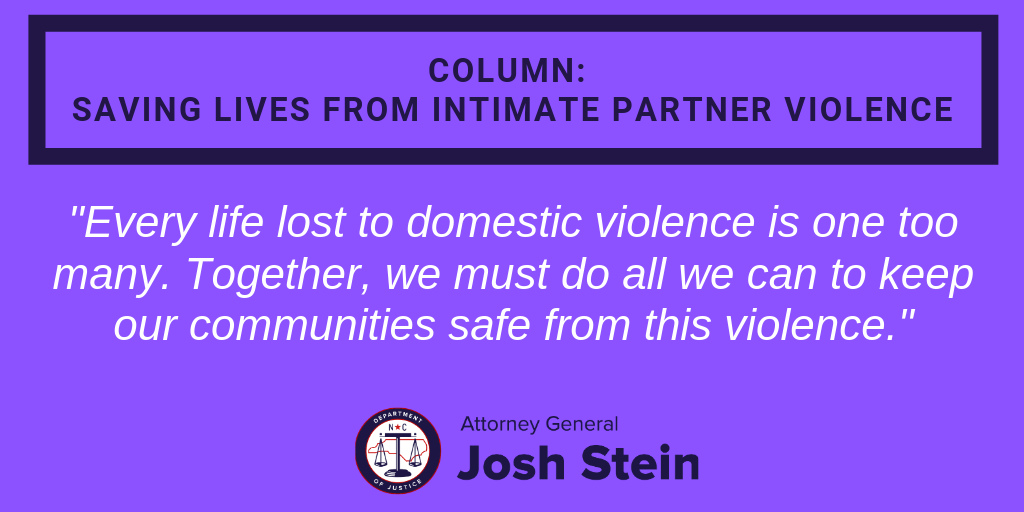
Attorney General Josh Stein
October 2019
So far this year in North Carolina, a staggering 44 people have died in domestic violence homicides. When our communities tragically lose someone to this kind of violence, we often ask ourselves what we could have done to prevent their death. This Domestic Violence Awareness Month, I’m proud that the North Carolina Department of Justice is launching a powerful new tool to proactively protect domestic violence victims who are at risk of being killed by their partners.
NCDOJ is training law enforcement and domestic violence service providers across our state on the Lethality Assessment Protocol (LAP). The LAP is a research-based checklist that law enforcement officers can use when they’re responding to domestic violence incidents. The checklist includes criteria such as past incidents of violence and other behaviors that research shows are linked to homicides. If, based on the LAP, an officer determines that a victim is at a high risk for being hurt, he or she follows a clear set of steps to immediately connect the victims with domestic violence service providers in their area. These providers can help give people the resources and assistance they need to get and stay safe.
Research shows that once victims who are in danger of being killed by their partner have access to domestic violence resources, they are much less likely to be assaulted again. That’s why the LAP has proven to be so effective in areas where it’s already in use – it gives us the opportunity to take action at a critical, life-saving moment.
My office’s Public Protection Section and the North Carolina Justice Academy, which my office oversees, along with the North Carolina Coalition Against Domestic Violence, will be conducting this training with law enforcement and domestic violence service providers across the state. Thanks to this tool, law enforcement and service providers will team up to better, and more quickly, help victims.
I’m hopeful that the LAP will help us protect people from intimate partner violence. But it’s not enough to confront this all-too-common tragedy. In August, Gov. Roy Cooper signed into law the Survivor Act, which my office drafted. The Survivor Act will provide $6 million to test sexual assault kits and require law enforcement agencies to submit kits from a reported sexual assault for testing within 45 days of collection moving forward. We know that many times, sexual assault isn’t perpetrated by a stranger – it’s done by intimate partners and people close to the victim. Getting justice for sexual assault survivors and getting rapists off the street will help us continue to confront domestic violence in our communities and make us all safer.
Of course, there’s more that we can all do. We all have a responsibility to look out for the people around us – our friends, our neighbors, and our coworkers. Be on the lookout for signs of domestic violence, including physical abuse, emotional manipulation, financial exploitation, isolation, changes in a person’s behavior and self-esteem, or intimidation and fear tactics. You can learn more at https://ncadv.org/signs-of-abuse. And if you or someone you know needs help, please visit enoughnc.org or call the National Domestic Violence Hotline at 1-800-799-7233 (SAFE) or 1-800-787-3224 (TTY) or online at www.thehotline.org. Every life lost to domestic violence is one too many. Together, we must do all we can to keep our communities safe from this violence.
###
